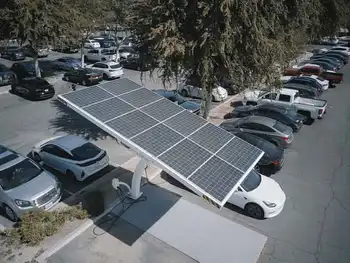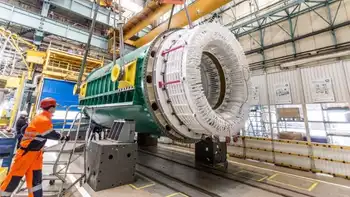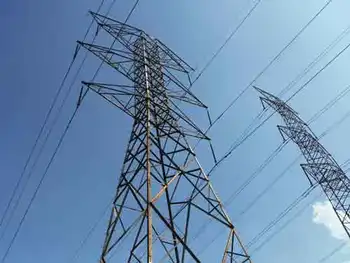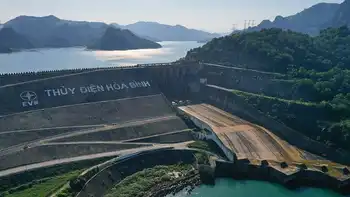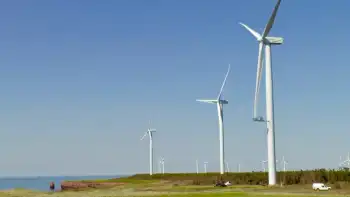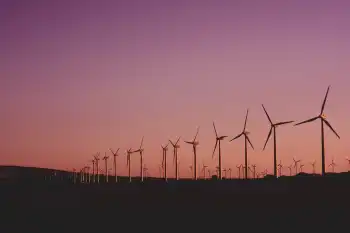Talks on nuclear power revived in Washington
By Tri-City Herald
High Voltage Maintenance Training Online
Our customized live online or in‑person group training can be delivered to your staff at your location.

- Live Online
- 12 hours Instructor-led
- Group Training Available
"It's on the table, let's put it that way, for the first time in many years," said Jeff King, a senior resource analyst for the Northwest Power and Conservation Council. "I'd regard that as a significant change. It's gone from being a total pariah... to something that may be needed."
Could a new reactor actually get built here? The signals are mixed at best.
Environmental opposition remains. Regulatory constraints and long lines for getting equipment would make it difficult to get a plant operating in the next 20 years, even if the public would accept it.
And for now, there's little reason to believe public opinion has changed - though political leaders are starting to at least consider the idea.
"I think it has to be on the table," Democratic Gov. Chris Gregoire said in a recent interview. "I think we're going to have to revisit this question."
Her announced challenger this year, Republican Dino Rossi, agrees: "This isn't something I would say no to. It's something we need to explore."
Dormant for years, the nuclear industry is being reborn and rebranded as a carbon-free power resource. License applications for 15 new reactors have been submitted to the U.S. Nuclear Regulatory Commission so far, and applications for 10 more could be submitted by year's end. Most of the activity is in the Southeast.
The Northwest's only nuclear power operator has formed a study committee to monitor industry developments. But expectations are low, even at Energy Northwest, which built and operates the 1,150-megawatt Columbia Generating Station north of Richland.
The public power consortium, formerly known as the Washington Public Power Supply System, also started but never finished four other plants following the meltdown of its financing.
One result was a citizens initiative that voters approved in hopes of avoiding any repeat of the WPPSS nuclear construction program's collapse in the early 1980s. The initiative requires any public entity to get voter approval for any large power project.
All of the five modern reactor designs approved by federal regulators in the U.S. would require that approval. Their generating capacities range from 1,175 to 1,700 megawatts, behemoths that each would generate enough power to light Seattle. At that size, they also might present uncomfortably large financial risks.
No one expects voters to have forgotten the $2.25 billion WPPSS bond default on two of its failed projects. And the Bonneville Power Administration-backed debt still owed on the other two canceled plants has yet to be fully paid off.
"I don't see a large group of people deciding we need new nuclear in the Northwest," said Vic Parrish, Energy Northwest's chief executive officer and a member of its nuclear study team. "I think it would fail."
While prospects may be better in Idaho, they're even worse in Oregon, where Portland General Electric shut down its troubled Trojan nuclear plant 40 miles northwest of Portland after only 16 years of operation rather than pay for costly repairs. The reactor vessel is buried at Hanford.
State law in Oregon now requires voter approval for any new nuclear plant and flat prohibits any nuclear construction before a national repository for spent fuel is licensed to operate.
"There are social-cultural aspects to the Northwest that makes us an anti-nuclear region," said John Harrison, a spokesman for the Power Council, a federal agency responsible for balancing energy and environmental priorities.
"People have long memories that a good portion of our Bonneville rates are going to pay off our old debt," he said. "It's not fair - 'They screwed up before, they'll screw it up again,' - But perceptions are important."
To change public attitudes in the Northwest, a widespread education campaign would be required to promote advances in the industry, officials say.
Parrish believes the governor's office would have to take part. And since it's the governor who signs the site certificate on new power plants, up-front support also is needed so potential project participants aren't scared away at the outset.
"You can't get the money without it," Parrish said. "A positive word is absolutely essential."
In the recent interview, Gregoire said she'd welcome a new look at nuclear, saying the state can't wean itself from carbon-emitting power plants with wind and solar power alone.
"We can't come close," she said.
As for nuclear, "the science of it, the safety of it have advanced dramatically," she said, even pledging to appeal to anti-nuclear interests.
"I will ask them to open up their minds," Gregoire said.
Rossi called nuclear power a "viable option" and agreed a concerted effort to promote advances in the industry is needed.
"I think you'd really have to go through and educate people on safety and where we are with technology," Rossi said. "If your only education is Jane Fonda and The China Syndrome, I think we've got a ways to go."
Washington's environmental movement has gone on a winning streak in recent years, securing laws banning utilities from acquiring new power from conventional coal plants while requiring them to buy more wind and solar power and the like. And so far, Northwest environmental leaders aren't warming to nuclear's carbon-free charm.
Nuclear power's biggest drawback remains its wastes. No permanent storage site for spent nuclear fuel has been completed.
Environmentalists envision too much untapped potential in energy efficiency and renewable energy to warrant discussion of nuclear. And until those sources are more greatly exploited, "it's not really a question people are open to engaging," said Tom Geiger, a spokesman for the Washington Environmental Council.
"I'm hearing some thawing as it were in other areas, but not for nuclear," said Sara Patton, executive director of the green-leaning Northwest Energy Coalition.
Nuclear power is "big and risky" at a time when new clean energy technologies provide options that are smaller, spread out and cheaper to build, Patton said.
"The alternatives that are out there tend to be more nimble in many ways," she said.
There are other problems that complicate nuclear construction in the near term. A worldwide surge in nuclear interest has overwhelmed manufacturers. There are long lines for generators, turbines, tubes for heat exchangers, large valves and bed plates and other large forgings.
Adrian Heymer, senior director for new plant deployment at the Nuclear Energy Institute, said it could take as long as five years to get equipment.
"It's a supply-and-demand type of equation," Heymer said. "There could be some bottlenecks."
But wait times should shorten as the industry rebuilds its manufacturing capacity, and regulatory timelines also should be reduced, he said.
While it could take as long as four years to get a federal license today, that may be cut to two and a half years once the first new licenses are awarded and plant developers have a template to follow, Heymer said.
But getting a construction permit at the state level also may take several years, particularly if a public vote is required.
"With any controversial project, it's going to take longer," said Allen Fiksdal, manager of Washington's Energy Facility Site Evaluation Council. "We would have very contentious, I assume, public hearings and meetings."
A nuclear project also might draw more parties to intervene in the courtlike adjudicative proceedings, which means "more witnesses, more cross-examination and that's a really time-consuming process," Fiksdal said.
Parrish said if there's a nuclear future in Washington, it might lie in the small-scale reactors being developed in other countries but not yet approved in the U.S. Not because the smaller plants could duck below the 350-megawatt threshold that triggers the public vote requirement for public utilities, but because they would be more manageable to develop and operate.
"That's a way public power can eat this elephant one bite at a time," he said.
But even that is years off. A prototype may not be online in the U.S. until the end of the next decade, Heymer said.
Resource analyst King believes nuclear may get a boost should the Northwest decide to shutter its coal plants to curtail carbon emissions.
In the meantime, he doesn't see much support for nuclear until the masses can be convinced the region has adequately invested in energy efficiency and renewable power and until a policy for waste storage can be executed, even if that policy is simply to leave waste at nuclear sites.
Moreover, he said nuclear won't fly in the Northwest until it flies somewhere else first.
"Some sort of conclusive evidence that it can be done successfully somewhere else would probably be a prerequisite," he said.





